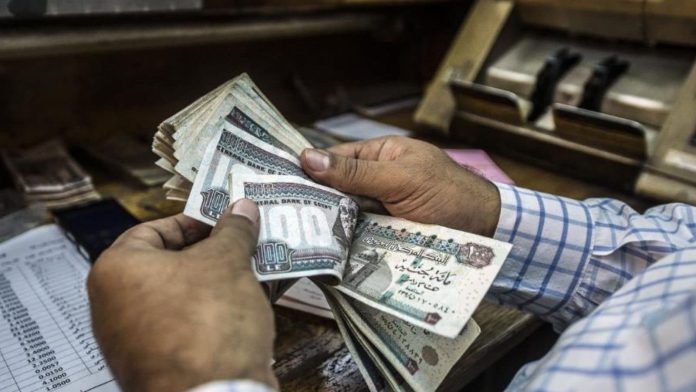[ad_1]
Egypt has dug itself a massive hole of debt. On Friday, the International Monetary Fund (IMF) will extend a $3 billion loan to the country, a fourth aid package in six years, as its financial tailspin continues.
The loan, along with billions of dollars in cash inflows from Abu Dhabi and Riyadh, are Band-Aids, experts say, designed to keep the Arab world’s most populous country afloat. Without proper reforms, however, Egypt may never be able to shake off its chronic financial woes and break its growing debt addiction.
In recent months, the Egyptian pound has plummeted, losing 14.5% of its value against the US dollar in October. The prices of vegetables, dairy products and bread skyrocketed. Some families are restricting their diets as their purchasing power shrinks, while others struggle to find imported products once available at their local stores.
In a country with a long history of political tension and a fast-growing population — currently 104 million people — the repercussions of economic pain can be far-reaching. When millions of Egyptian protesters toppled former President Hosni Mubarak during the 2011 Arab Spring, “Bread, freedom and social justice” was among the most popular chants.
Egypt’s main Gulf Arab backers recognize what’s at stake here. Billions of dollars from Abu Dhabi and Riyadh have poured into the Egyptian economy in recent years. Both the United Arab Emirates and Saudi Arabia saw giant windfalls on the back of this year’s high oil prices. They’ve used some of that money to bolster the economies of their allies in the Middle East.
In August, Abu Dhabi Developmental Holding Company (ADQ), one of the emirate’s wealth funds, announced a number of investments in publicly listed companies in Egypt, “building on its long-term commitment to investing in the country’s economic growth through its $20 billion joint strategic investment platform,” it said in a statement.
Saudi Arabia’s Public Investment Fund (PIF) also launched the Saudi Egyptian Investment Company (SEIC) in August, a company dedicated to investments in several vital sectors of the Egyptian economy. SEIC has bought $1.3 billion dollars’ worth of shares in four Egyptian businesses.
Still, the Egyptian economy has struggled to shake off its economic woes. Inflation is at a five-year high, making food and other basic goods unaffordable to tens of millions of vulnerable Egyptians.
Kicking the can down the road
The North African state now owes more than $52 billion to multilateral institutions, at least 44.7% of which is owed to the IMF alone.
Its foreign debt “has more than tripled between June 2013 and March 2022, raising the external debt-to-GDP ratio from 15% to approximately more than 35%,” writes Stephan Roll, head of the Africa and Middle East Division at the German Institute for International and Security Affairs (SWP) in Berlin.
“And there is no end in sight,” he adds.
But how did Egypt get here? The problem, analysts say, lies in Egypt’s apparent inability to change the way its economy works, including easing the tight control exerted by the military and its many enterprises. This is a problem, the experts say, that stunts private sector competition and drives away investment.
Egypt has been on the path to debt-addiction for several years. In 2016, President Abdel Fattah al-Sisi sealed a deal with the IMF granting a $12 billion loan. The bailout was granted on condition of Egypt’s currency floating freely, which ultimately slashed its value by half in a matter of weeks and pushed up inflation. Harsh austerity measures — including cuts to subsidies on fuel and electricity — were enforced to try to restore government finances.
Despite the bailout, Egypt struggled to fully pick itself back up, with analysts attributing the repeated failures to revitalize the economy to loose agreements and the mismanagement of loans.
“Not only are they [loans] temporary Band-Aids, they’re not conditioned in a manner that would actually push for the reforms necessary to ever allow the Egyptian economy to recover,” said Timothy Kaldas, a policy fellow at the Tahrir Institute for Middle East Policy.
“Recently they [the multilateral lenders] seem to have started to finally notice that, and seem to want to see some of those reforms, but they haven’t successfully gotten the Egyptians to agree to them,” he added.
The cash-strapped country also spends much of its funds on luxury megaprojects that critics call “unnecessary” when other sectors seem to be in dire need of support, including education and health care. Data pertaining to state spending on these projects is not available to the public.
“Loans were not primarily used to improve the economic framework conditions but to protect the revenues and assets of the armed forces, to finance major projects in which the military could earn significant money, and to pursue an expansive military build-up,” Roll told CNN.
Authorities have repeatedly defended the state megaprojects, arguing that they improved infrastructure, transportation and telecommunications.
“These are projects that cannot be put to the side, as they are projects needed by the Egyptian citizen,” said Prime Minister Mostafa Madbouly in a May press conference. He blamed the Covid-19 pandemic and the effects of the Ukraine war for exacerbating Egypt’s financial problems.
Close to 30% of Egypt’s population is below the poverty line, authorities say. The World Bank in 2019 estimated that “some 60% of Egypt’s population is either poor or vulnerable,” highlighting a growing disparity between the rich and poor.
Authorities insist they are making progress. Sisi has repeatedly called on military-owned companies to be listed on the stock exchange, but few concrete steps have been taken to liberalize those enterprises.
In September 2019, brief and rare demonstrations broke out across Egypt, despite a strict ban on protests. They were driven primarily by economic grievances. Protesters also decried the military’s alleged influence over finances. Security forces quickly quelled the demonstrations and more than 4,000 people were arrested.
Read all the Latest News here
[ad_2]
Source link

